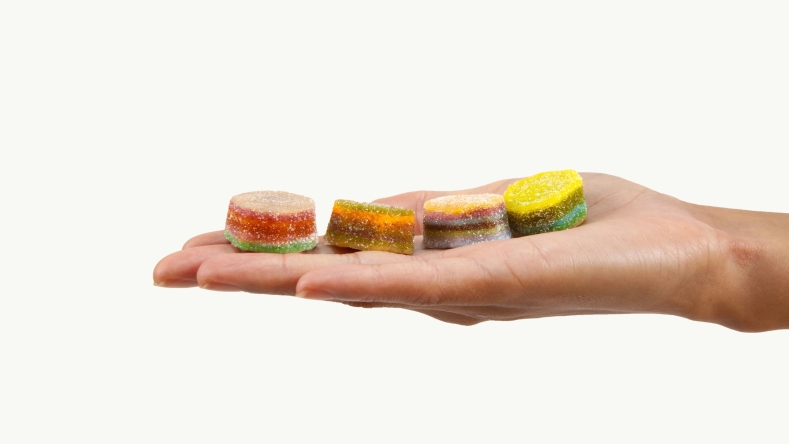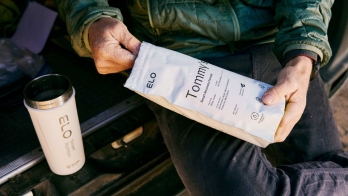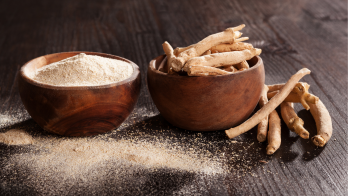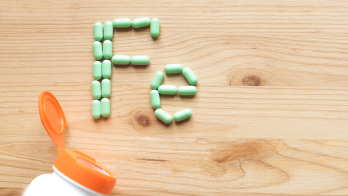The ultimate guide to sugar alcohols: Benefits, side effects, and how to use them
Sugar alcohols are enticing low-calorie alternatives to sugar, but what exactly are they, and are they safe? Here is everything you need to know about sugar alcohols, from their benefits and side effects to how to use them.

Sugar alcohols are the talk of the town when it comes to the food and supplements industry. As they continue to rise in popularity, you might find them in more and more food products including baked goods, candies, chewing gum, and beverages. But what are sugar alcohols, are they safe, and what are the benefits and drawbacks? Here is everything you need to know about sugar alcohols.
What are sugar alcohols?
Sugar alcohols are a group of carbohydrates that have a similar molecular structure to sucrose (sugar) but have a slower and reduced absorption in the gut and a lower caloric value [1]
The difference in molecular structure between sugar alcohols and traditional sugar (sucrose) makes them more chemically stable, meaning sugar alcohols can retain their sweetness and structure during processing and storage. Sugar alcohols are also less susceptible to crystallization and browning (otherwise known as the Maillard reaction), preserving both texture and color of foods.
Sugar alcohols occur naturally in foods and can be found in many meals or snacks that we regularly consume. For example, mannitol occurs naturally in pineapples, olives, and asparagus, and erythritol is found naturally in fruits like grapes, peaches, and pears. Sugar alcohols are also made commercially through fermentation, including those used in Elo’s personalized 7-layer Smart Gummies [2]

Try Elo Smart Gummies!
Elo Smart Gummies how Elo Smart Gummies work design your personalized gummy vitamin stack today
Types of sugar alcohols
There are eight different types of sugar alcohols: erythritol, sorbitol, xylitol, mannitol, maltitol, isomalt, lactitol, and hydrogenated starch hydrolysates [ 1 12

Erythritol
Erythritol is a type of sugar alcohol naturally found in fruits and vegetables including pears and melons, and in fermented foods like beer, wine, and soy sauce. Commercially produced erythritol is also commonly used as a sugar substitute in low-sugar and low-calorie products (including Elo Smart Gummies).
Erythritol is 80% as sweet as sucrose, making it one of the sweetest-tasting sugar alcohols on the market [3]
Erythritol vs stevia
Erythritol and stevia are both low-caloric or non-caloric sweeteners but they differ in their composition and sweetness. While erythritol is a sugar alcohol, stevia is made up of steviol glycosides, compounds extracted from the stevia rebaudiana plant.
Erythritol is more similar in taste, sweetness, and texture to regular sugar than stevia [6] [5]
Allulose vs erythritol
Like erythritol, allulose is also a low-calorie sweetener. However, allulose is not a sugar alcohol; it is a rare, naturally occurring sugar and is metabolized differently from sugar alcohols. Although neither yields calories, erythritol is absorbed and eliminated through the urine, while allulose is metabolized much like sucrose [7]
While they both serve as low-calorie sweeteners, erythritol has been shown to have many benefits including supporting dental health. Allulose also tends to be more expensive, making it less cost-effective than erythritol [8]
Sorbitol
Sorbitol is a sugar alcohol that naturally occurs in berries like blackberries, raspberries and strawberries, and other fruits such as apples, apricots, avocados, cherries, peaches and plums.
Research shows that it’s 60% as sweet as sugar and has about 35% fewer calories per gram, which makes it a popular option for commercial products (like packaged foods and beverages) since it reduces calories and provides sweetness, texture, and moisture retention [ 13
Xylitol
Xylitol is one of the most commonly used sugar alcohols because its taste closely mimics that of sugar, but has fewer calories. It’s naturally found in fruits and vegetables like strawberries, raspberries, mushrooms and cauliflower, but it’s also a common ingredient in sugar-free chewing gums, mints, and oral care products like throat lozenges and cough syrups [ 14

Sugar alcohol benefits
Calorie reduction
Sugar alcohols provide fewer calories than sugar, so they may be beneficial for people trying to lose weight by reducing their calorie intake [ 15 16
Dental health
Sugar alcohols are non-cariogenic, meaning they do not promote caries or tooth decay, which may make them a better alternative to sugar-sweetened foods in regards to dental health [ 1 17
Blood sugar control
Because sugar alcohols are only partially absorbed, they produce a significantly lower glycemic response in the body than sugar. This means sugar alcohols do not raise blood sugar levels as much, which is important for people with diabetes [ 9
Prebiotic effects
Research suggests sugar alcohols have some prebiotic effects which may support gut health [ 1 18
Side effects of sugar alcohols
While sugar alcohols are well-tolerated by most people, some side effects could include GI disturbances, like gas, bloating, and diarrhea [ 19
Tips for incorporating sugar alcohols into your diet
Use it in small amounts. Better tolerance, especially when ingested and less risk of potential side effects.
Pay attention to how you feel. Different sugar alcohols can have different effects; some may work better for you than others.
Frequently asked questions about sugar alcohols
Are sugar alcohols bad for you?
Sugar alcohols that have been approved for consumption, including erythritol, sorbitol, xylitol, mannitol, maltitol, isomalt, lactitol, and hydrogenated starch hydrolysates, have been thoroughly tested and are generally recognized as safe [ 1 12
These low-calorie sweeteners are not only safe but also provide certain health benefits including calorie reduction, and improved dental health and blood sugar control, like being non-cariogenic or causing a low glycemic response [ 10
Do sugar alcohols count as carbs/sugar?
Sugar alcohols have low-digestibility carbohydrates, meaning they are not fully digested or absorbed in the GI tract. This is why they provide fewer calories than sugar. However, although they are less digestible compared to sucrose, a small amount is still absorbed, and the rest is excreted in urine [ 9
Is erythritol safe?
There has been a lot of research and studies to test the safety of erythritol. Erythritol is “generally recognized as safe” by the FDA (Food and Drug Administration).
In general, excessive intake of sugar alcohols can lead to gastrointestinal issues, including nausea and bloating. These undesirable effects are due to the fact that sugar alcohols are poorly absorbed. However, erythritol is mostly absorbed relative to the other sugar alcohols. This makes erythritol more tolerated and, therefore, leads to fewer gastrointestinal side effects [ 2 4
Are sugar alcohols keto?
Sugar alcohols are typically considered keto because they have a slower absorption rate and a much lower impact on blood sugar levels than sucrose [ 11
Summary
Sugar alcohols are low-calorie sweeteners that are growing in popularity in the food production industry. There are eight types of sugar alcohols approved for consumption: erythritol, sorbitol, xylitol, mannitol, maltitol, isomalt, lactitol, and hydrogenated starch hydrolysates. Sugar alcohols can be a good alternative to sucrose, especially for people who have diabetes or are looking to reduce their calorie intake. Due to their reduced absorption, sugar alcohols contain fewer calories and produce a much smaller glycemic response in the body. Sugar alcohols have been vastly tested and are generally recognized as safe.
Disclaimer: The text, images, videos, and other media on this page are provided for informational purposes only and are not intended to treat, diagnose or replace personalized medical care.
Key takeaways
Sugar alcohols are popular low-calorie alternatives to sucrose (sugar) due to their slower and reduced absorption in the gut.
There are eight types of sugar alcohols which vary in structure as well as their digestibility, absorption, and metabolism.
Sugar alcohols occur naturally in foods and are also commercially produced through fermentation. They can be found in many meals or snacks that we regularly consume.
Erythritol is 80% as sweet as sucrose, making it one of the sweetest-tasting sugar alcohols. It's “generally recognized as safe” by the FDA, and can be found in Elo Smart Gummies.
Sugar alcohols have several benefits including reduced calories, lower glycemic impact, reduced dental caries and plaque, and prebiotic effects.
References
Grembecka, M. (2015, February 28). Sugar alcohols-their role in the Modern World of Sweeteners: A Review - European Food Research and Technology. SpringerLink. https://link.springer.com/article/10.1007/s00217-015-2437-7
Mazi, T. A., & Stanhope, K. L. (2023, January 1). Erythritol: An in-depth discussion of its potential to be a beneficial dietary component. MDPI. https://www.mdpi.com/2072-6643/15/1/204
Kawanabe, J., Hirasawa, M., Takeuchi, T., Oda, T., & Ikeda, T. (1992). Noncariogenicity of erythritol as a substrate. Caries Research, 26(5), 358–362. https://doi.org/10.1159/000261468
Meyer-Gerspach, A. C., Beglinger, C., & Islam, Md. S. (2019). Metabolic effects of the natural sweeteners xylitol and erythritol: A comprehensive review. Critical Reviews in Food Science and Nutrition, 60(12), 1986–1998. https://doi.org/10.1080/10408398.2019.1623757
Gao, J., Brennan, M. A., Mason, S. L., & Brennan, C. S. (2017, February 22). Effects of sugar substitution with “Stevianna” on the sensory characteristics of muffins. Journal of Food Quality. https://www.hindawi.com/journals/jfq/2017/8636043/
Miller - Wiley Online Library. (n.d.). https://onlinelibrary.wiley.com/doi/abs/10.1002/jsfa.8170
Teysseire, F., Bordier, V., Budzinska, A., Van Oudenhove, L., Weltens, N., Beglinger, C., Wölnerhanssen, B. K., & Meyer-Gerspach, A. C. (2023). Metabolic effects and safety aspects of acute D-allulose and erythritol administration in healthy subjects. Nutrients, 15(2), 458. https://doi.org/10.3390/nu15020458
Xia, Y., Cheng, Q., Mu, W., Hu, X., Sun, Z., Qiu, Y., Liu, X., & Wang, Z. (2021). Research advances of D-allulose: An overview of physiological functions, enzymatic biotransformation technologies, and Production Processes. Foods, 10(9), 2186. https://doi.org/10.3390/foods10092186
Msomi, N. Z., Erukainure, O. L., & Islam, M. S. (2021, March 15). Suitability of sugar alcohols as antidiabetic supplements: A Review. Journal of food and drug analysis. https://www.ncbi.nlm.nih.gov/pmc/articles/PMC9261844/
Mäkinen, K. K. (2011, May 11). Sugar alcohol sweeteners as alternatives to sugar with special consideration of Xylitol. Karger Publishers. https://karger.com/mpp/article/20/4/303/203379/Sugar-Alcohol-Sweeteners-as-Alternatives-to-Sugar
Cleveland Clinic. (2023, December 8). Sugar alcohols may not be as safe as you thought. https://health.clevelandclinic.org/what-to-know-about-sugar-alcohols
Godshall, M. A. (2016). Candies and Sweets: sugar and chocolate confectionery. In Elsevier eBooks (pp. 621–627).
https://doi.org/10.1016/b978-0-12-384947-2.00679-6
Kris Sollid, R. (2019, April 18). What is Sorbitol?. Food Insight.
https://foodinsight.org/what-is-sorbitol/
Kris Sollid, R. (2019, January 7). What is xylitol?. Food Insight.
https://foodinsight.org/what-is-xylitol/
Sugar Alcohol - Yale New Haven Hospital. (n.d.).
https://www.ynhh.org/services/nutrition/sugar-alcohol
Mazi, T. A., & Stanhope, K. L. (2023). Erythritol: An In-Depth Discussion of Its Potential to Be a Beneficial Dietary Component. Nutrients, 15(1), 204.
https://doi.org/10.3390/nu15010204
Sugar alcohol. Sugar Alcohol - an overview | ScienceDirect Topics. (n.d.).
https://www.sciencedirect.com/topics/food-science/sugar-alcohol
Ruiz-Ojeda, F. J., Plaza-Díaz, J., Sáez-Lara, M. J., & Gil, A. (2019). Effects of Sweeteners on the Gut Microbiota: A Review of Experimental Studies and Clinical Trials. Advances in nutrition (Bethesda, Md.), 10(suppl_1), S31–S48.
https://doi.org/10.1093/advances/nmy037
Leech, J. (2023, February 2). What are sugar alcohols, and are they a healthy sugar swap?. Healthline.
https://www.healthline.com/nutrition/sugar-alcohols-good-or-bad








